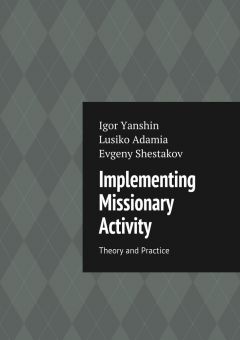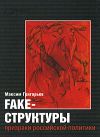Текст книги "Implementing Missionary Activity. Theory and Practice"

Автор книги: Lusiko Adamia
Жанр: Юриспруденция и право, Наука и Образование
Возрастные ограничения: +6
сообщить о неприемлемом содержимом
Текущая страница: 1 (всего у книги 3 страниц) [доступный отрывок для чтения: 1 страниц]
Implementing Missionary Activity
Theory and Practice
Igor Vladimirovich Yanshin
Lusiko Emmanuilovna Adamia
Evgeny Nikolaevich Shestakov
© Igor Vladimirovich Yanshin, 2017
© Lusiko Emmanuilovna Adamia, 2017
© Evgeny Nikolaevich Shestakov, 2017
ISBN 978-5-4485-6522-9
Создано в интеллектуальной издательской системе Ridero

Chapter 1. Legislation Concerning Missionary Activity
Constitution of the Russian Federation
Article 28.
Everyone shall be guaranteed the freedom of conscience, the freedom of religion, including the right to profess individually or together with others any religion or to profess no religion at all, to freely choose, possess and disseminate religious and other views and act according to them.
Article 29.
1. Everyone shall be guaranteed the freedom of ideas and speech.
2. Propaganda or agitation instigating social, racial, national or religious hatred and strife shall not be allowed. Propaganda promoting social, racial, national, religious or linguistic supremacy shall be banned.
3. No person may be forced to express their views and convictions or to renounce them.
4. Everyone has the right to freely seek, receive, transmit, produce and disseminate information by any legal means. The list of information constituting a state secret is determined by federal law.
5. The freedom of mass communication shall be guaranteed. Censorship shall be banned.
Federal Law «On freedom of conscience and religious associations» №125-FZ
Chapter III.1. Missionary Activity
Article 24.1. Content of Missionary Activity
1. For the purposes of this federal law, missionary activity is recognized as the activity of a religious association, aimed at disseminating information about its beliefs among people who are not participants (members, followers) in that religious association, with the purpose of involving these people as participants (members, followers). It is carried out directly by religious associations or by citizens and/or legal entities authorized by them, publicly, with the help of the media, the internet or other lawful means.
2. Missionary activity of religious organizations can be carried out:
– On religious premises, buildings and structures, as well as on land on which such buildings and structures are located;
– In buildings and structures belonging to religious organizations or provided to them in order to carry out their statutory activities, as well as on land on which such buildings and structures are located;
– On premises belonging to religious organizations or provided to them in order to carry out their statutory activities, as well as on land on which the buildings containing the relevant premises are located, by agreement with the owners of such buildings;
– In premises, buildings, and structures and on land owned by or provided to institutions established by religious organizations;
– On land owned by or provided to religious organization;
– In places of pilgrimage;
– In cemeteries and crematoria;
– On the premises of educational institutions historically used for religious ceremonies.
3. Sharing beliefs is not permitted in residential buildings, except as provided for by Article 16, Part 2 of this Federal Law.
4. It is prohibited for a religious association to disseminate information on its doctrine while on premises, in buildings or structures, or on land on which there are such buildings and structures, which belong to another religious organization without the written consent of the relevant governing body of the religious association which owns said property.
Article 24.2. The Legal Conduct of Missionary Activity
1. Citizens engaged in missionary activities on behalf of a religious group, are required to be in possession of a decision of the general meeting of the religious group authorizing their activity. The authorization must contain details of the written acknowledgment of receipt and registration of the establishment and commencement of activities of the religious group, issued by the territorial body of the federal body of state registration.
2. Missionary work on behalf of a religious organization may be carried out by the head of a religious organization, a member of its governing body and (or) the clergy of a religious organization.
Other individuals and legal entities have the right to carry out missionary work on behalf of a religious organization if they have a document issued by the governing body of the religious organization confirming the authority to carry out missionary work on behalf of the religious organization. This document must contain details of the document confirming the entry of the religious organization to the Unified State Register of Legal Entities, issued by the federal body of state registration or a territorial authority.
These rules do not apply to missionary work provided for in paragraph 2 of Article 24.1 of this Federal Law.
3. Foreign nationals and stateless persons who are lawfully in the territory of the Russian Federation shall have the right to carry out missionary work:
On behalf of a religious group – only in the territory of the Russian Federation in which the religious group is registered and was issued a written acknowledgment of receipt and registration of the establishment of the beginning of activities of the specified religious group, in possession of the document referred to in paragraph 1 of this Article;
On behalf of a religious organization – only in the territory or territories of the Russian Federation in which the organization is registered and only in accordance with the scope of the activities of this religious organization, in the possession of the document referred to in paragraph 2 of this Article.
4. Foreign nationals who have entered the territory of the Russian Federation at the invitation of religious organizations in accordance with Article 20 of this Federal Law shall have the right to carry out missionary work only on behalf of the said religious organization only in the territory or territories of the Russian Federation in which the organization is registered in accordance with the scope of its activities with the document referred to in paragraph 2 of this article.
5. It is prohibited to engage in missionary activity on behalf of a religious association whose objectives and actions violate the law, or who have been liquidated by a court decision, or whose activities are suspended or prohibited in the manner and on the grounds stipulated by this Federal Law, Federal Law of July 25, 2002 №114-FZ «on countering extremist activity» or the Federal law dated March 6, 2006 №35-FZ «on Combating terrorism», as well as individuals referred to in paragraphs 3 and 4 of article 9 of this Federal law.
6. Missionary activity with the following objectives or aims is prohibited:
Violation of public security and public order;
Extremist activity;
Forcing the break-up of a family;
Infringement of a citizen’s personal rights and freedoms;
Activities damaging to the morals, health, and well-being of citizens, including the use of narcotic and psychotropic drugs, hypnosis, indecent behavior, or other unlawful acts in connection with their religious activity;
Encouragement of suicide or the refusal on religious grounds of medical assistance which jeopardizes a person’s life or health;
Obstruction of compulsory education;
Coercion of members and followers of a religious association and other persons to donate their property to the religious association;
Preventing a citizen from leaving a religious association through threatened or actual use of force or illegal action;
Inciting citizens to refuse to fulfill their civic duties established by law or to commit other illegal acts.
7. In the case of the missionary activities provided for in paragraphs 5 and 6 of this Article, the religious association is responsible for any missionary activity carried out on its behalf by its agents.
Housing Code of the Russian Federation from 29.12.2004 №188-FZ
Article 17.Purpose of premises and limits of their use. The use of residential premises
Point 3. It is prohibited for a missionary group to be located on, or conduct missionary activities on premises designated for industrial production or residential premises, except as stipulated in Clause 16 Federal laws of September 26, 1997 No. 125-FZ «About liberty of conscience and about religious associations»
Article22. Conditions for converting residential premises into non-residential premises and non-residential premises into residential premises
Point 3.2. The conversion of residential premises into non-residential premises for the purpose of religious activity is prohibited.
Russian Federation Code of Administrative Offences from 30.12.2001 number 195-FZ, Article 5.26
3. Religious organizations conducting activities without displaying/indicating the official full name of the organization, including missionary activity involving the release or distribution of literature, printed, audio and video materials without marking the material with the name of the organization, or incomplete, or deliberately false labeling on said material, —
Punishable by an administrative fine in the amount from thirty thousand to fifty thousand rubles with confiscation of literature, printed, audio and video materials.
4. Implementation of missionary activity in violation of the law on freedom of conscience, freedom of religion and religious associations-
Punishable by an administrative fine on citizens in the amount from five thousand to fifty thousand rubles; for legal entities – from one hundred thousand to one million rubles.
5. Violation provided by section 4 of this Article, if committed by a foreign national or a stateless person, —
Punishable by an administrative fine in the amount from thirty thousand to fifty thousand rubles with the possibility of administrative expulsion from the Russian Federation.
Chapter 2. General Principles of Conducting Missionary Activity
Any discussion of how to conduct religious and missionary activity on the basis of the new laws must first begin with a definition of what is and what is not missionary work.
This is a very important step, since most of the issues related to missionary work will disappear as soon as we clearly define the concept of «missionary activity».
For believers, the concept of missionary activity is inextricably linked with their faith and beliefs, and by extension, their daily lives. The Christian faith is by its very nature missional. As believers it is normal for us to do things such as preach to friends or acquaintances or post pictures and comments on social media sites quoting scripture. Is this considered «Missionary Activity» under the new laws?
Can I visit my friends and talk to them about my faith, or is this an illegal activity prohibited by law?
How do I know if I am engaging in prohibited activity or am within my legal rights? Where is the boundary?
The answer to this important question can be found in the articles of the Law «On Freedom of Conscience and Religious Associations, particularly in paragraph 1, Article 24.2:
For the purposes of this federal law, missionary activity is recognized as the activity of a religious association, aimed at disseminating information about its beliefs among people who are not participants (members, followers) in that religious association, with the purpose of involving these people as participants (members, followers). It is carried out directly by religious associations or by citizens and/or legal entities authorized by them, publicly, with the help of the media, the internet or other lawful means.
As we read this law, we see that it defines several marks or characteristics of Missionary Activity. It is very important for us to understand these characteristics, as they differentiate «missionary activity’ from other religious activities.
We have identified four main characteristics of Missionary Activity:
– Missionary Activity is carried out directly by the religious association and/or authorized persons and organizations. The spread of one’s personal faith cannot be automatically attributed to the missionary work.
– Missionary activity is aimed at those who are not yet a follower of a religious association; therefore, talking about faith among fellow believers is not missionary activity.
– The purpose of missionary activity is recruiting people to join a religious association. If you’re just talking about your faith without reference to a particular religious group, it is not missionary work.
– Missionary activity is carried out in public. Talking about one’s faith at home is not a public activity.
As noted in a letter written by the Office of the President of the Russian Federation, missionary activity is characterized by the totality of the above characteristics. The activity of a religious association, which does not contain all four characteristics, cannot be regarded as a missionary activity. Therefore, these activities are not subject to restrictions set by the Federal Law against missionary activity.
Personal testimony about one’s faith is not marked by the above characteristics; therefore, it cannot be regarded as missionary activity.
It is important to understand that the modern version of the law does not consider the activities of individuals (Russian citizens and other persons legally residing in the territory of Russia) as missionary. Such cases are covered by Article 28 of the Constitution of the Russian Federation. There are certain restrictions on religious and missionary activity for foreigners. These will be discussed in a separate chapter.
What does this mean?
If friends come to your house to visit, or you are visiting someone, and you’ve decided to talk about your faith and convictions, you are fully within your rights to do so. This basic right is guaranteed by the Russian Constitution.
Based on the postulate that missionary activity is characterized by the totality of the characteristics contained in the legal definition, we can conclude that an individual citizen engaged in the distribution of opinions on the street, with a public audience including non believers, with the intention to recruit people into a religious organization, but acting on their own initiative, without authorization from a religious organization is not conducting missionary activity.
If you find yourself in a situation similar to the one above and are confronted with law enforcement officials whose definition of missionary activity does not agree with yours, what should you do? We will cover this in a later chapter entitled «What to do if you are accused of violating the laws of missionary activity.».
Chapter 3. Religious Activities of Individuals
As we saw in the previous chapter, the laws and regulations governing missionary activity do not apply to the activities of individuals acting on their own, without official connection or authorization to conduct missionary activity on behalf of religious organizations.
The right to preach and share one’s beliefs is guaranteed under Articles 28 and 29 of the Constitution of the Russian Federation.
Article 28.
Everyone shall be guaranteed the freedom of conscience, the freedom of religion, including the right to profess individually or together with others any religion or to profess no religion at all, to freely choose, possess and disseminate religious and other views and act according to them.
Article 29.
1. Everyone shall be guaranteed the freedom of ideas and speech.
2. Propaganda or agitation instigating social, racial, national or religious hatred and strife shall not be allowed. Propaganda promoting social, racial, national, religious or linguistic supremacy shall be banned.
3. No person may be forced to express their views and convictions or to renounce them.
4. Everyone has the right to freely seek, receive, transmit, produce and disseminate information by any legal means. The list of information constituting a state secret is determined by federal law.
5. The freedom of mass communication shall be guaranteed. Censorship shall be banned.
It is within the rights of every individual believer, when speaking on their own behalf, to preach and share their beliefs; further, one can freely pray, and have conversations about one’s faith in a public place. These activities are not prohibited by law.
Whether on the street, on premises (residential or industrial) sharing of beliefs by an individual believer does not meet the legal definition of missionary activity under paragraph 1 Article 24.1 of the Law «About Liberty of Conscience and about Religious Associations»:
For the purposes of this federal law, missionary activity is recognized as the activity of a religious association, aimed at disseminating information about its beliefs among people who are not participants (members, followers) in that religious association, with the purpose of involving these people as participants (members, followers). It is carried out directly by religious associations or by citizens and/or legal entities authorized by them, publicly, with the help of the media, the internet or other lawful means.
In the previous chapter we identified four necessary characteristics of Missionary Activity:
– Missionary Activity is carried out directly by the religious association and/or authorized persons and organizations. The spread of their personal faith cannot be automatically attributed to the missionary work.
– Missionary activity is aimed at those who are not yet a follower of a religious association; therefore, talking about faith among fellow believers is not missionary activity.
– The purpose of missionary activity is recruiting people to join a religious association. If you’re just talking about your faith without reference to a particular religious group, it is not missionary work.
– Missionary activity is carried out in public. Talking about one’s faith at home is not a public activity.
This means that you may freely:
– share your faith with friends, acquaintances, colleagues at work, people on the street, in public transport, in a residential premises without special permission from any religious organization;
– Make posts on social networks about your beliefs, talk about your faith, and even invite people to worship services;
– Publicly proclaim your faith; within the framework of the Law on Rallies, Marches, Demonstrations, you may only use individual picketing to share your beliefs.
It is also important to note that attending religious services, meetings in homes, participating in prayer meetings, and praying in public are not missionary activity, as the purpose of these activities is not recruiting people into an organization.
If you plan to regularly distribute religious literature, we recommend obtaining permission from a religious organization to carry out missionary activity. Otherwise, you may receive some unwanted attention from the authorities. Proper permission and documents will save you from unnecessary legal entanglements which can be costly and time consuming.
Chapter 4. Missionary Activity of Religious Groups
General Provisions
Any discussion concerning the activity of religious groups should begin by recognizing the unique way they are defined by federal law. While federal law recognizes the activities of religious groups, it grants them no legal status as a legal entity. According to Paragraph 1, Article 7 of the Federal Law «On Freedom of Conscience and Religious Associations», a religious group is a voluntary association of individuals formed for the profession and dissemination of faith, carrying out activity without state registration and acquisition of legal personality.
In paragraph 3 of Article 7, the act specifies the right of religious groups to conduct worship services, conduct religious rites and ceremonies, as well as provide religious education and guidance for their followers.
In addition to not being recognized as legal entities, until recently religious groups were not required to notify authorities of their existence.
However, with the adoption of amendments to the Federal Law «On Freedom of Conscience and Religious Associations» religious groups are no longer a purely private affair of citizens. Given the recent legislative initiatives we should expect stricter regulation of their activity in the future.
Characteristics of Missionary Activity of a Religious Group
According to Article 24.1 of the Federal Law «On Freedom of Conscience and Religious Associations» the notion of missionary activity is defined as an activity of a religious association and, therefore, a religious group. It is very important to note that, unlike many of the laws of the Russian Federation, laws regarding missionary activity only govern the activities of associations, not individuals. This was already mentioned in this manual.
In accordance with the norm established by the Federal Law «About Freedom of Worship and Religious Associations» paragraph 1 Article 7, the process for the formation of religious groups is not specified. A religious group must somehow be differentiated from a ministry conducted by a local religious organization (e.g. home cell) and from a group of individual citizens gathered to profess and share their faith under the protection of Article 28 of the Constitution of the Russian Federation. Without substantial evidence, establishing the factual existence of a religious group is difficult.
It is important to note that the religious group, according to meaning of paragraph 2, Article 7 of the Federal Law «About Freedom of Worship and Religious Associations», exists in the structure of a Centralized religious organization or independently. Local religious organizations cannot have religious groups.
Missionary activity is a purposeful activity aimed at disseminating information on doctrine among non-participants (members, followers) of a religious association. This means that a religious group deliberately decided to spread the word about its doctrine among non-members of the group. Religious activities such as worship, religious rites or ceremonies, not specifically aimed at outsiders are not considered missionary activity. Missionary activity is not only targeted at outsiders, but it also should be carried out in public, with the help of the media, information and telecommunication network «Internet» or other lawful means.
It is still possible, however, for religious groups to be involved in missionary activity.
First of all, it should be understood that conducting missionary activity within the boundaries of worship, religious rites, and ceremonies is not covered by the law on missionary activity in the event that the premises where these activities are carried out are provided by a religious group for conducting worship, religious rituals, or ceremonies, based on a rental contract or contract for uncompensated use. This presents two problems for religious groups.
First, a religious group cannot act as a party in an agreement because religious groups are not legal entities. Secondly, according to paragraph 1 of article 7 of the Law «About Liberty of Conscience and about Religious Associations», rooms and property for the activities of a religious group are to be provided by its participants Therefore, it is necessary to sign such contract with one of participants of religious group when such agreements are desirable.
Recall that the subject of the contract is the provision of premises, buildings or buildings for worship, ceremonies, ceremony.
Before beginning any activity, a religious group must submit a «notice of beginning or continuing activity’ (form RG001) to the territorial authority of the Ministry of Justice of the Russian Federation. According to paragraph 2, Article 7 of the Federal Law «About Freedom of Worship and about Religious Associations» this notice will contain information about the group’s fundamental beliefs, place of worship services, religious rites and ceremonies, leader (representative), a list of group members. This list is to include their full name and home address. Documents proving the acceptance of form RG001 should be saved and recorded. This is very important as the information may be required at a later date.
In addition, according to Art. 24.2 of the Federal Law «On Freedom of Conscience and Religious Associations» citizens carrying out missionary activity on behalf of the religious group are required to be in possession of a decision from a general meeting of the religious group authorizing them to engage in missionary activity. This document must include the details from the written acknowledgment of receipt and registration of the notice on the establishment and the beginning activities, issued by the territorial Department of the Ministry of Justice of the Russian Federation.
Upon receipt of the decision of the religious group to grant authorization, these representatives have the right to carry out missionary activity. But it is important to note that, unlike religious organizations, where the head of the organization, the members of its body, its executive body and (or) priesthood automatically have the right to carry out missionary activity, the leaders, priests, and members of a religious group are required to possess this decision of the general meeting. In addition, according to paragraph 3 and 4, article 24 of the Federal Law «On Freedom of Conscience and Religious Organizations», foreign nationals who have entered the territory of Russia at the invitation of a religious group have the right to carry out missionary work only on behalf of this group, and only on the territory of the Russian Federation where a religious group is authorized to act.
Engaging in missionary activity while not in possession of such a decision authorizing activity, as well as the absence of documentation certifying the filing a form RG001, will be regarded as the exercise of missionary activity in violation of the requirements of the legislation. Such individuals will be subject to administrative fine in accordance with paragraph 4 (paragraph 5 for foreigners and persons without citizenship) Article 5.26 of the Administrative Code of the Russian Federation.
Territory of Missionary Activity of a Religious Group
Up until now, the law on religious organizations did not mention the territorial scope of the activities of religious groups.
No such terminology was found anywhere.
The latest changes to the law, however, have begun to define the territorial scope of the activities of religious groups. These changes primarily impact the activity of foreign citizens working on behalf of religious groups.
Paragraph 3, Article 24.2 of the law «On freedom of conscience and religious associations»
3. Foreign nationals and stateless persons who are lawfully in the territory of the Russian Federation shall have the right to carry out missionary work:
on behalf of the religious group – only in the territory of the Russian Federation in which the religious group is registered and was issued a written acknowledgment of receipt and registration of the establishment of the beginning of activities of the specified religious group, in possession of the document referred to in paragraph 1 of this Article;
Notice that this law does not restrict the rights of religious groups (or religious organizations discussed below) to spread their faith outside their own city, town or village. The law only restricts the rights of foreigners working with these groups.
Self-determination of Religious Groups
As mentioned above, it is very difficult to define a religious group. Many questions will arise in relation to this.
If, for example, a religious organization sends a missionary to another city or town, and people gather with them for joint prayer and studying the scripture, are they a religious group, or just a branch of the religious organization which sent the missionary? We must properly answer these questions to determine how to engage in missionary activity. We will discuss this further in the section entitled «Missionary’s Activity».
Because of this ambiguity, it will be necessary for each congregation of believers to determine its own status.
This may be:
– ministry of a religious organization from another city (for example, a visiting missionary);
– A meeting of believers protected under Article 28 of the Constitution; gathered for common prayer, but without inviting non-believers
– A religious group which has filed a notice of commencement of activities with the Russian Federation Ministry of Justice.
Current legislation does not require a meeting of believers to be registered as a religious group if the group already belongs to a religious organization.
Внимание! Это не конец книги.
Если начало книги вам понравилось, то полную версию можно приобрести у нашего партнёра - распространителя легального контента. Поддержите автора!








































